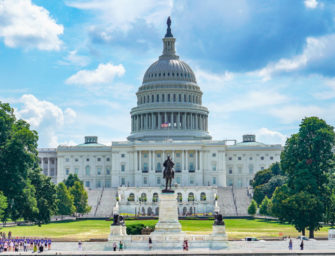President Trump Skips Science in His State of the Union Address
Last night, in his first State of the Union speech to Congress and the American people, President Trump addressed some of the challenges and opportunities facing the nation. In his remarks, the President talked about a number of issues, including immigration and infrastructure, that his Administration has prioritized in the near future. What is especially concerning is what the President did not talk about.
President Trump failed to acknowledge that new infrastructure – from shoring up our ports to ensuring the safety of extensive network of roads and highways – requires investing in science to ensure that these massive public work programs are completed safely, within budget, and will last for generations to come. Furthermore, he railed against immigration which is a fundamental component of a strong scientific enterprise as it brings some of the best and brightest scientific minds to our shores to work on issues which are often exceedingly complex and require great cooperation and ingenuity. And right now, the federal government is sorely lacking in sufficient scientific advice. This shortsighted perspective may also stymie participation in scientific meetings by sowing fear and confusion amongst those who wish to travel from abroad to meetings in the U.S. or, conversely, for those who traveling back to the States from overseas meetings.
One year into this Administration, the President has failed to even nominate the Director of the Office of Science and Technology Policy (OSTP). This key office – tasked with “providing the President and others within the Executive Office with advice on the scientific, engineering, and technological aspects of the economy, national security, homeland security, health, foreign relations, the environment, and the technological recovery and use of resources, among other topics” – is usually elevated to Cabinet level to advise the President Directly on key science issues. Early last year, AGU sent a petition with 10,000 signatures nearly asking for a Science Advisor to be named quickly – but there has been no action. This is the longest any Administration has been without such crucial science advice.
What’s more, this is not the only key science position that the Administration has yet to appoint. In addition to operating without a Director, OSTP lacks Associate Directors for Environment, Science, Technology, National Security and International Affairs. Other key posts that remain unfilled included the Department of Energy (DOE) Office of Science Director; State Department Assistant Secretary for Oceans, International, Environmental and Scientific Affairs; Department of Agriculture Science Advisor; the Environmental Protection Agency (EPA) Assistant Administrator for Research and Development and the Deputy Director of the National Science Foundation.
In addition, nominations for several critical science positions have been put forth but have not yet been confirmed by the Senate including the top spots at National Aeronautics and Space Administration (NASA) and the National Oceanographic and Atmospheric Administration (NOAA) and a Director for the Department of Interior’s U.S. Geological Survey (USGS).
Equally as troubling, as noted in my “2017 in Review” From the Prow post, over the past year we have seen “an increasing number of moves by the Administration to hinder scientific integrity, silence or even discredit federal scientists, and stifle the open communication of science both within the U.S. and internationally. (These) directives include the Administration’s travel ban on individuals from certain nations and EPA Administrator Scott Pruitt’s policy to disallow grantees from serving on the EPA scientific advisory boards, among many others.”
It is unacceptable that we begin 2018 with such a dearth of scientific and technological knowledge at the highest levels of our government. It’s not just immigration and infrastructure that rely on this knowledge. Forecasting to better protect communities from devastating natural disasters; preventing our electrical grid from being knocked out by a powerful solar storm; helping our military understand climate-induced human migration; helping our businesses make decisions based on real-time weather and other data…we will all be put at risk if the Administration doesn’t start to fill these critical science positions. 2017, during which the United States experienced 16 major weather and climate disaster events that resulted in 362 lives lost and more than $300 billion dollars in economic, is a clarion call that we must invest in the scientific enterprise to ensure our ability to accurately predict and quickly respond to events of national concern.
For our members, the good news is that your voice is more powerful than ever. Your member of Congress needs to hear from you – about science information important for decision making; about why science is so critical to our economy, public health and welfare, and national security; and especially, why they need to push the Administration to do more for science. And the media and public need to hear from you so that they can understand how integral science is to our daily lives.
It’s easy to play a part. Sign up to receive Science Policy Alerts; learn how to communicate better through our Sharing Science network. And if you are ready to do more, please consider signing up for our new Voices for Science Program which is designed help you hone your science communications skills and then connect you with a variety of audiences in your own community. As the ground-breaking anthropologist Margaret Mead said, “Never doubt that a small group of thoughtful, committed, citizens can change the world. Indeed, it is the only thing that ever has.”




There are no comments
Add yours